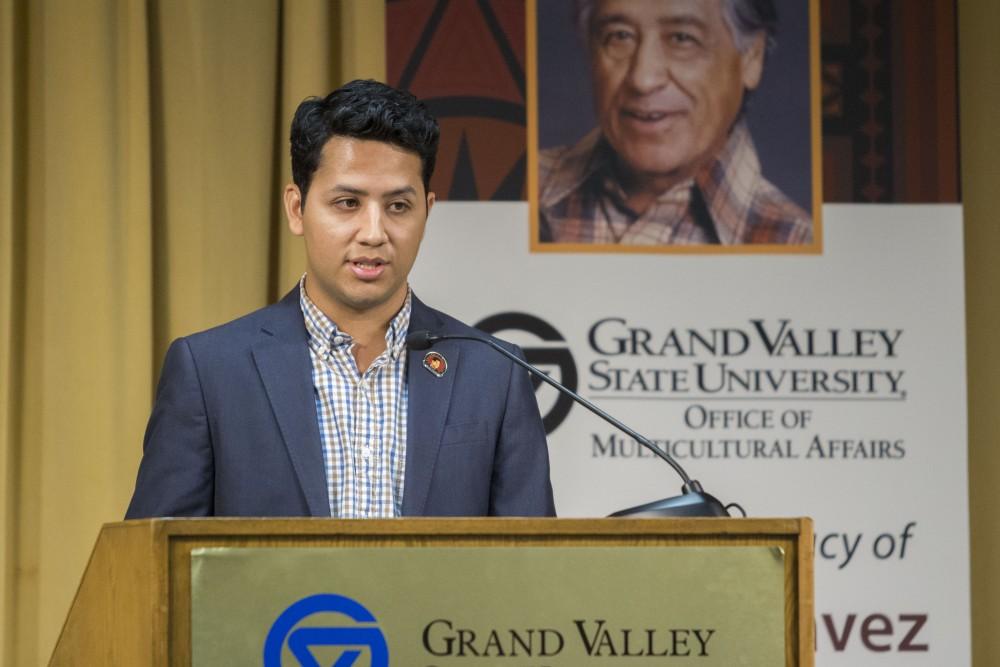Carrying on the legacy

GVL/Mackenzie Bush – Andres Chavez, grandson of Civil Rights activist, Cesar Chaves, speak about how Lantina Millennials can be the voice of change in the 21st century Friday, March 24, 2017.
Mar 27, 2017
A hero for farm workers. An icon for the Latino community. A civil rights activist who would not stop until all people had their rights. César Chávez was and is an icon for the grassroots and civil rights movements as he championed unions for the underrepresented workers in California and across the country.
Since his death in 1993, his family and friends have carried on his legacy, never stopping from taking the fight to the people and demanding change. His grandson, Andrés Chávez, exhibits the same drive to bring change that his grandfather did many years ago.
Chávez was at Grand Valley State University Friday, March 24, in the Kirkhof Center to speak about his grandfather’s legacy and how millennials can help to create change in today’s world.
“When I’m asked, ‘Andrés? Do you think millennials can be the change of tomorrow?’ of course I’m going to say yes,” Chávez said.
His speech touched on many key issues of his grandfather’s movement, including the fight for equal rights for all people. Chávez told the story of how his grandfather marched in a gay pride parade, even though his devout Catholic followers might have taken issue with this, because he believed every person deserved equality, regardless of who they loved, what their skin color was or what deity they believed in.
Chávez also spoke on the ways in which his grandfather inspired activism when he was young. He talked about how when he was a child, his father would take him to protests and pickets. He also told a story about how they went to a water park while on vacation in Mexico but turned around and left when they saw a man at the front gate fasting in protest over unfair working conditions.
“As we arrived, there was a man camped outside with a tent, and he had a big sign, and the sign read, ‘Boycott. Bad working conditions. I’ve been fasting for 25 days,’” Chávez said. “To make a short story shorter, my dad drove in the entrance and immediately out the exit.”
As a millennial himself, Chávez talked about how he saw millennials being a voice for change in today’s day and age. Citing the 2016 election and the policies of the current president, Chávez said now is the time more than ever to fight for those who have been targeted by hate.
“It’s important more than ever that we stand united, that we organize, that we mobilize and we take action,” Chávez said. “Regardless of the color of our skin, or regardless of where we come from, we are each other’s brothers’ and sisters’ keepers.”
The audience reaction was overwhelmingly positive for Chávez, and at points the room erupted into cheers and applause after points he made and statements he said. His coming to campus also attracted those who were fans of his grandfather.
“His way of expressing himself was very true to the work that he has probably already (done),” said Margarita Solis-Deal, director of the Dominican Center at Marywood. “So, you could tell that he is a person of great experience and dedicated to his grandfather’s passion, but he’s creating his own as well. He’s creating his own identity.”
Drawing from the lessons he learned from his grandfather’s work and through involvement in the farm workers movement and the experience he has gathered today, Chávez told the audience to take a lesson from the farm workers movement when trying to make change of their own.
“We must also remember what we learned today about the farm workers movement,” Chávez said. “Solidarity is paramount and that despite our defeats, we never, ever give up.”





















